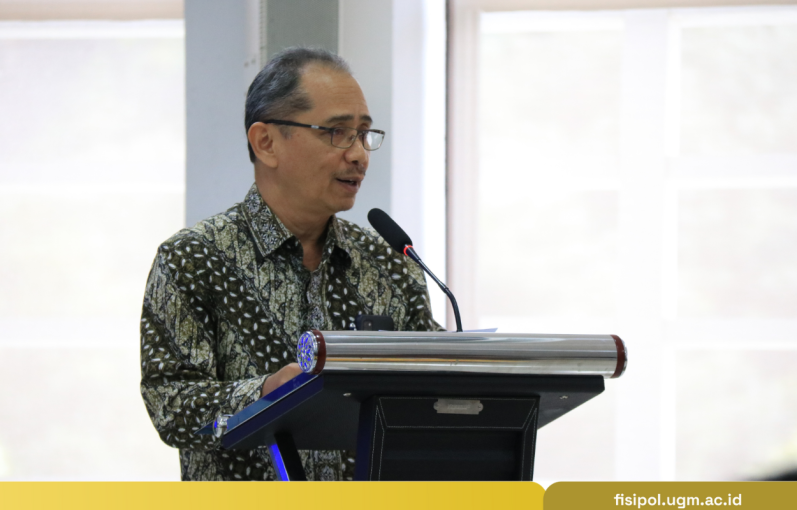
Yogyakarta, September 19th 2024─Climate crisis, geopolitics, and economic tensions are currently becoming global problems. In a speech entitled “The Urgency of Navigating University Initiatives in Responding to Polycrisis and Promoting Inclusive Democracy”, Prof. Dr. Suharko, S.Sos., M.Si explained his analysis of the impact of the global situation on the future, including in the context of implementing democracy. The speech was delivered as part of the 69th Anniversary of the Faculty of Social and Political Sciences UGM on Thursday (19/9).
Suharko said the current global crisis could accumulate into a polycrisis. Not only Indonesia, but the whole world is currently facing the same global crisis. According to Suharko, there are five characteristics of polycrisis that can be identified, namely complex and dynamic networks, non-linear causal relationships, casual processes that cross administrative boundaries, social sectors, and across disciplines, and the tendency to form a “Black Swan” phenomenon. All of these problems develop in a complex manner, requiring complex solutions that affect many sectors.
“The root cause of the polycrisis in Indonesia is the concentration of power. The outbreak of various scandals in Indonesia today indicates the strengthening of autocracy in political, economic, social and political lines,” said Suharko. The statement refers to the recent implementation of democracy which is considered to be increasingly far from the true principles of democracy. This phenomenon has also occurred many times, causing tremendous anger from the public.
Revisiting the ratification of Government Regulation in Lieu of Law (Perppu) No. 2/2017 on Community Organizations, the turmoil of democratic abuse began to occur. Suharko explained that Jokowi as president freed the government to dissolve all kinds of civil movements that protested against the restriction of democracy through this regulation. Then in 2019, the House of Representatives passed the Criminal Code that violated the principles of democracy, namely the rules regarding insulting the president, vice president, and state institutions can be punished.
The degradation of democracy continued until the 2024 elections when the Constitutional Court suddenly changed the Presidential and/or the Vice Presidential candidacy requirements in Law Number 7 Year 2017. The decision became a golden path for the President’s eldest son, Gibran Rakabuming Raka to run as a Vice Presidential candidate. “Various illustrations of democratic regression in Indonesia show that democratic robbery is a long and systematic process,” said Suharko.
This condition is exacerbated by technological disruption, which has led to a variety of new products in society. The development of Artificial Intelligence (AI), the proliferation of financial technology (fintech) companies that serve loans, the transition of digital employment, and the freelance industry. Suharko said that the government’s focus on realizing an equitable digital society often overlaps with the prevailing interest principle. All of these policies have guaranteed the public interest, or only certain parties.
Beyond geopolitics, digitalization, and economics, the world is dealing with an earth that is increasingly showing the impact of all human activities. The earth’s temperature is estimated to have increased dramatically over the past few years, giving rise to the issue of climate crisis. Of course, this phenomenon arises due to excessive and irresponsible exploitation of nature by industry. Suharko mentioned that a series of government programs are not well-targeted, causing ecological problems. The government has also not implemented systematic handling in cases of environmental damage.
“There are several areas adjacent to the National Strategic Project (PSN) or other extractive activities, many ecological disasters have emerged. Several cases of water and river pollution were found that disturbed settlements,” said Suharko. He mentioned the case of the extensification of PLTU activities in Cilacap which caused respiratory problems for local residents. Unfortunately, this case is just one of millions of cases of environmental damage and climate crisis.
Universities as national academic centers have a great responsibility to pioneer strategies to resolve the polycrisis. Many affected communities often have their rights restricted, excluded, oppressed, and even excluded. Universities must be positioned as more than just a space for research and discussion, but also the formation of future seeds that are able to restore the nature of democracy based on the interests of the people.
“Political education is the key to the rise of the civic political movement that has been undermining democracy. The barrier between the campus and the people must be removed,” said Suharko. The speech fully described the challenges faced and how the academic sector needs to act. The hope is that the contribution of the campus can be echoed again so that people can be fulfilled with their rights in democracy.
